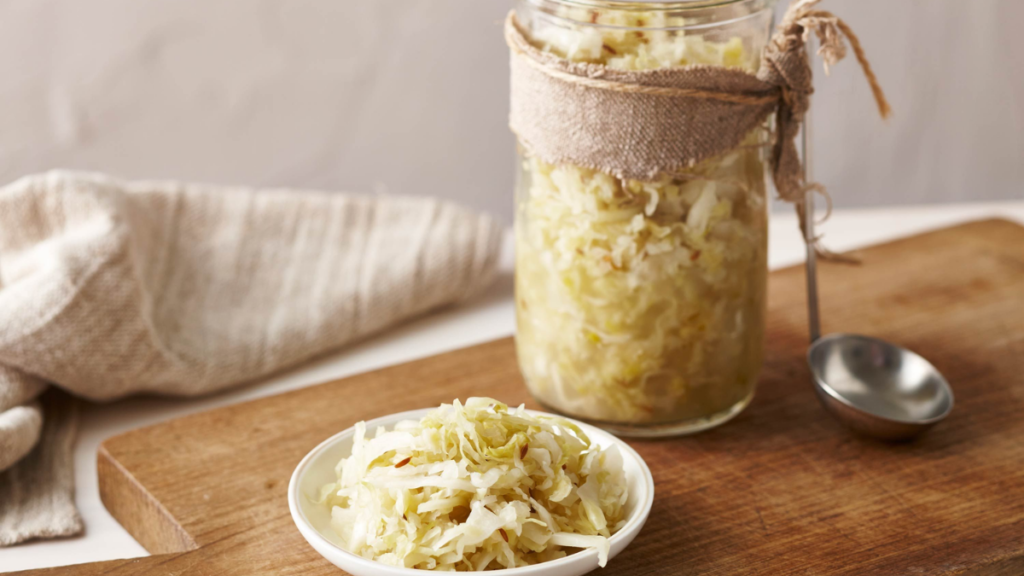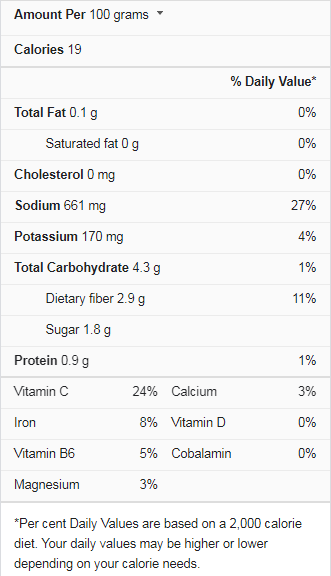Sauerkraut is high in vitamins and minerals. Because sauerkraut is low in calories and fat, it’s tempting to consume a lot of it, especially if you’re trying to lose weight. As with most foods, moderation is key to integrating sauerkraut into a healthy diet. Sauerkraut is rich in salt, with one serving containing 9% of the recommended daily intake.
Adding high-sodium sauerkraut to your routine won’t help because most Americans’ diets are already high in salt. Too much sodium in the diet can cause heart disease, stroke, kidney disease, and congestive heart failure. To avoid these issues, limit yourself to one portion of sauerkraut per day, and avoid processed foods to keep your salt levels low.
Sauerkraut Nutrition Facts
Sauerkraut’s Health Benefits
Because sauerkraut is manufactured from cabbage, it provides many of the same health benefits as a typical leafy green. On the other hand, the fermenting process provides health benefits unique to sauerkraut. Let’s examine the health benefits of including this cuisine in your diet.
Reference: Sauerkraut- production, composition, and health benefits
Enhance Digestion
Sauerkraut provides two grams of fiber per serving, a substance that aids digestion. Fiber softens and increases the weight and size of a constipated person’s feces, making it easier to pass. Fiber can help persons with diarrhea by absorbing excess water and solidifying their stools.
However, it’s not just the fiber content of sauerkraut that makes it so excellent for digestion. Sauerkraut is also high in probiotics, which can help to improve your gut health. Sauerkraut is a great food for digestion because of this combination.
Weight Loss Encouragement
Obesity affects more than 40% of adults in the United States and is linked to an increased risk of heart disease, digestive issues, and type 2 diabetes.
Sauerkraut may aid weight loss for a variety of reasons. Sauerkraut, for one thing, is low in calories and high in fiber, both of which might help you feel fuller for longer. This can help you reduce how much food you eat in a day without making you hungry.
Sauerkraut’s probiotics may also help to reduce fat absorption. These researches are still in the early phases, and the findings have yet to be confirmed in humans. However, these preliminary findings are encouraging and suggest that probiotics are important for weight loss.
It Strengthens your Immune System
Sauerkraut is high in probiotics and nutrients that help the immune system. To begin with, the bacteria that live in your gut can have a significant impact on your immune system. Sauerkraut’s probiotics may help maintain a healthy gut lining by improving the balance of microorganisms in your gut. A healthier gut lining keeps harmful substances from “leaking” into your body and triggering an immunological response. Maintaining a healthy gut flora also aids in the prevention of dangerous bacteria growth and may even increase the creation of natural antibodies.
Furthermore, eating probiotic foods like sauerkraut daily may lower your chance of infections like the common cold and urinary tract infections. Eating probiotic-rich foods regularly may help you heal faster if you get sick. In addition to probiotics, sauerkraut is high in vitamin C and iron, two nutrients that support a healthy immune system ( When you have a typical cold, increasing your vitamin C consumption will help you get rid of symptoms faster.
Reduces Stress and Promotes Brain Health
While your mood might influence what you eat, it’s also assumed that the opposite is true. What you consume has an impact on your mood and cognitive function. A growing number of research are uncovering a close link between your stomach and your brain. They discovered that the bacteria in your stomach could be able to convey messages to your brain, changing how it functions and sees the world. Fermented, probiotic foods like sauerkraut, for example, contribute to the development of a healthy gut flora, which has been shown in studies to help reduce stress and promote brain function.
Probiotics have been shown to boost memory and reduce anxiety, sadness, autism, and even obsessive-compulsive disorder symptoms (OCD). Sauerkraut may also help keep your brain healthy by improving the absorption of mood-regulating nutrients like magnesium and zinc in your stomach. However, other experts caution that sauerkraut components may interact with monoamine oxidase inhibitors (MAOIs), a drug used to treat depression, anxiety, and Parkinson’s disease. Talk to your doctor before adding sauerkraut to your diet if you’re on these medications.
It may Reduce the Risk of Certain Cancers.
Sauerkraut’s major ingredient, cabbage, includes antioxidants and other plant elements that may help reduce the risk of certain malignancies. According to researchers, these substances may help reduce DNA damage, inhibit cell mutations, and block the excessive cell growth that leads to tumor development. The fermentation of cabbage may also produce plant chemicals that inhibit the formation of precancerous cells. Certain genes have been linked to a higher risk of cancer, and chemical components in your meals can sometimes influence the expression of these genes. According to two recent research, cabbage, and sauerkraut juice may help reduce cancer risk by lowering the expression of cancer-related genes.
As per another study, women who ate a lot of cabbage and sauerkraut from their teens through adulthood had a lower risk of breast cancer. According to the study, women who ate more than three servings per week had a 72 percent lower risk of breast cancer than those who ate less than 1.5 servings per week. Another study on men found that cabbage had a similar effect on prostate cancer risk. However, there are a limited number of research, and not all of them found the same outcomes. As a result, further research is required before firm conclusions can be drawn.
May Promote Heart Health
Sauerkraut could help you live a longer, healthier life. Because it’s high in fiber and probiotics, it may help lower cholesterol levels. Sauerkraut contains probiotics that may assist patients with hypertension in decreasing their blood pressure modestly. When people take at least 10 million CFUs each day for more than eight weeks, they have the best results. Sauerkraut is also one of the few plant sources of menaquinone or vitamin K2. Vitamin K2 is thought to help prevent calcium deposits from forming in the arteries, lowering the risk of heart disease.
Throughout a 7–10 year trial period, regular consumption of vitamin-K2-rich foods was connected to a 57% lower chance of dying from heart disease. Another study found that every ten micrograms of vitamin K2 ingested per day lowered women’s risk of heart disease by 9%. (75Trusted Source). One cup of sauerkraut has roughly 6.6 micrograms of vitamin K2 in it.
How Much Sauerkraut should you Consume Daily?
Yes, eating a little sauerkraut every day is good for you. If this is your first time eating sauerkraut, start small, preferably 3 g per serving, to get the best outcomes with the least adverse effects. You should consume roughly a spoonful of sauerkraut daily to reap the digestive benefits. This is readily accomplished by adding a small quantity to your dinner dish, and it is well-recognized that doing so aids digestion and prevents constipation. Sauerkraut is a high-nutrient, probiotic-rich food that you should consume roughly a tablespoon or 10 grams of each day. If you feel comfortable, gradually increase your intake of sauerkraut to six tablespoons (60 grams) per day.
However, it is not recommended that you consume too much. Heart disease, stroke, renal disease, and congestive heart failure can be exacerbated by too much sodium in the diet. Limit yourself to one portion of sauerkraut per day to avoid these problems, and avoid processed meals to keep your sodium levels low. The average serving size of sauerkraut is about 30 grams or about a third to a half of a cup. Holly Howe, author of Fermentation Made Easy!, suggests avoiding uncomfortable gas or bloating from fermented foods. Sauerkraut is delectable, but it’s best to start small.
How do you Eat Sauerkraut in the Healthiest Way Possible?
If you want to reap the benefits of your naturally fermented sauerkraut, avoid heating it to kill the beneficial enzymes and probiotics. Sauerkraut can be stirred into a warm bowl of soup or sprinkled on top of a dish. We improve the health of our digestive system by maximizing our gut flora and regulating our gut microbiome by eating foods like sauerkraut. Probiotics can also be found in fermented foods such as kimchi, miso, and pickles. Sauerkraut can be added to green salads or used as a burger topper.
You should consume roughly a spoonful of sauerkraut per day to reap the digestive benefits. This is readily accomplished by adding a small quantity to your dinner dish, and it is well recognized that doing so aids digestion and prevents constipation. One of the best ways to do this is to eat raw sauerkraut, which contains vitamins K, C, and B, calcium, magnesium, dietary fiber, folate, iron, copper, manganese, and potassium.
Is Sauerkraut Beneficial to your Liver?
Fermented foods like kimchi, sauerkraut, and jun tea, in addition to being gut-health gems and immune-boosting powerhouses, also aid your liver in removing heavy metals from your system. Studies suggest that helpful microorganisms can break down and eliminate uric acid, lowering the quantity of acid that reaches your kidneys when it comes to kidney health. Consume fermented foods daily, such as sauerkraut, kimchi, kombucha, kefir, or yogurt. Fatty liver disease used to be something that only drinkers had to worry about, and not any longer.
According to a 2013 study, “non-alcoholic” liver disease affects 19 percent of adults, or 28.8 million people—nearly one-fifth of the population. Sauerkraut can boost your immune system, improve digestion, lower your risk of certain diseases, and even help you lose weight. Try eating a small amount of sauerkraut every day to get the most advantages. Antioxidant vitamins E and C are abundant in this fermented meal. Sauerkraut has been proven in a study to have anti-inflammatory properties by lowering NO generation in LPS-induced murine macrophages.
Is it True that Sauerkraut is Excellent for your Kidneys?
Sauerkraut is a well-known superfood,’ suggested at the top of the list of foods to consume in a healthy diet because of its versatility and outstanding taste. It’s a low-calorie food, with only 27 calories per cup, and it’s high in folate, vitamin B6, riboflavin, thiamin, and vitamin K.If you keep your sauerkraut refrigerated, it should last for four to six months after opening. It’s critical to keep track of when you’re using it and seal it after each use because it can quickly spoil if fresh bacteria come into touch with it.
Sauerkraut is alive and will ferment past its peak if not kept at a consistent temperature. As a result, the RIGHT STUFF is frequently found in the refrigerator area of health-food stores or at farmer’s markets. Recommendations. There are ways to lower the amount of sodium in sauerkraut if you appreciate the flavor. The sodium content of the cabbage is reduced to 939 mg per cup after draining the brine liquid. Rinse the sauerkraut to reduce the salt content even more.
Is Sauerkraut High in Salt?
Many probiotic-rich foods, such as kimchi, sauerkraut, and miso, are high in salt because they are used to preserve the food and foster the growth of healthy bacteria. Other probiotic-rich foods, on the other extreme, are low in sodium. Kefir, kombucha, and yogurt are examples of this. Sauerkraut, unlike cabbage, can be heavy in salt. If you’re watching your salt intake, keep this in mind. Fiber, vitamins, and minerals abound in sauerkraut.
Its probiotics also absorb these nutrients, making sauerkraut more nutritious than raw cabbage or coleslaw. It’s a low-calorie, fat-free snack high in fiber, iron, and vitamins C and K. It’s also a probiotic because it’s a naturally fermented substance. Sauerkraut has a high sodium content that should only be consumed modestly to avoid absorbing too much salt.
Conclusion
Sauerkraut contains vitamin K2, which is important for bone health. Two proteins that bind to calcium, the most prevalent mineral in bones, are activated by vitamin K2. This is claimed to aid in the strengthening and health of bones. In numerous studies, vitamin K2 is advantageous to bone health. For example, postmenopausal women who took vitamin K2 supplements had lower age-related bone mineral density loss rates.
In several other studies, taking vitamin K2 supplements lowered the risk of spine, hip, and non-spine fractures by 60–81 percent. However, supplements were utilized in some of these studies to administer exceptionally high doses of vitamin K2. As a result, it’s unknown if vitamin K2 received only from sauerkraut would have the same effect.




